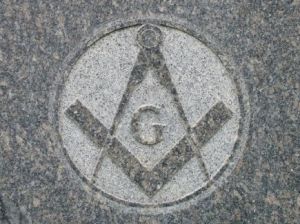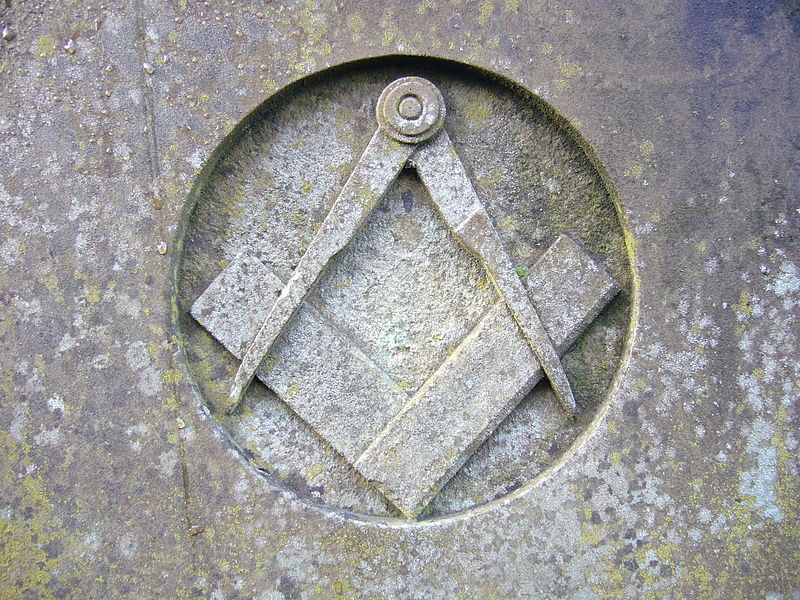NOTE: Below is a question for the new segment, ‘Questions with Duncan’. To learn more about this, please see the Parent Page (Questions with Duncan) which is listed under the Maranatha Treasure hunt.
T hanks Duncan. Can the meaning of the Key and Lock be found without knowledge of the secrets within Freemasonry? ~JohnC
hanks Duncan. Can the meaning of the Key and Lock be found without knowledge of the secrets within Freemasonry? ~JohnC
Yes, I do believe it can. Much is said about ‘Secrets’ within Freemasonry. Although there are those inside and out of Freemasonry that believe there are hidden ‘meanings’ to the Fraternity, the actual secrets are quite literally only the gestures, handshakes and passwords. So really they are tools to help discover anything else.
But I don’t believe that is what you mean – or if not – it is not what others may think you mean. I think a Masonic mind would find it easier to appreciate, the Key and Lock, but it is not vital. If you wanted to gain an insight into Masonic rituals, they are available in books and on the internet. I hope that helps. D
I will continue to post Questions with Duncan over the next couple of weeks or so, and add each to the parent page for easier review.
If you would like to ask a question, please feel free to use the contact form above.


Thanks Duncan. That is great to know since I’m not a Freemason. So intriguing!
oh…..you mentioned a book…..now I have to get it…lol…..
Hi Duncan,
It is great to see this and your other recent post at this website. Always wishing the best for you and your family. Your contribution to this endeavor is tremendous, it will not be forgotten. There is still discussion at the tweleve.org Maranatha forum.
Hi Nate, Thank-you for that. There are others posting there who are quite reasonalble and friendly, and not demeaning. And on topic, Duncan has made appearances there, even after be berated left only comments that were kind and uplifting.
Duncan, just this morning, coming out of the nightly slumber, I was thinking of those “words of the King” and for some reason, the first and last letter – C(ontentment) …. (ric)H .. and how their numerical equivalent to the Maranatha puzzle page 38.
So, I don’t know if you’ve read the many other postings of Jenny here, but given that you had a Six Questions some years ago, thought you might find this interesting, quotes from Six Questions of another puzzle:
“The key word is contentment. If you can find it, everything else has already fallen in place.”
( https://mysteriouswritings.com/six-questions-with-forrest-fenn-author-of-the-thrill-of-the-chase/ )
” It is interesting to know that a great number of people are out there searching. Many are giving serious thought to the clues in my poem, but only a few are in tight focus with a word that is key. ”
( https://mysteriouswritings.com/six-questions-more-with-forrest-fenn/ )
Still working on the challenge(s) of Maranatha. Hope to being hearing more from you.
Be Well
Hi Everyone- so pleased to be able to hear more from Duncan as well as everyone else who is left searching for the answer. Maranatha came to my attention at a particukar moment and I’m not sure how things would have turned out had it not been there. Definitely changed my life and for the better.
There were some in the Tweleve forum that may have let the idea of a monetary award get the best of them. Not many of those personalities are left. Just us die hards, I suppose.
For those interested, and as some may have seen me mention before, I have found the writing of George Steinmetz to be quite illuminating and inspirational, particularly from a symbolic perspective. (“Freemasonry, Its Hidden Meaning”, in particular). Glad to know all of you here and thanks Jenny for continuing this series.
But surely Nate you can’t blame the punters who bought a puzzle book that had a £1M prize for the prize being offered? Wasn’t that a direct intent of the author/publisher – to attract people who wanted to crack a puzzle and win the prize? The author/publisher obviously relied on that ‘greed’ to push the book sales – surely that was the purpose of the prize fund?
Not sure I follow Nate. You say that you don’t think that ‘greed’ was the intent, then follow by saying ‘…some extra incentive..’. Wasn’t that incentive based on greed? The puzzle book could have been published without a prize – simply the honour of knowing you had solved the puzzle.
What on earth did you then throw in ‘character assassination’ for? Where is there any hint of a character assassin?
Nate,
No I don’t understand your position more clearly. You threw into a post ‘greed’ and then ‘character assassin’ and then proceed to dig the hole deeper.
If the ‘prize’ wasn’t trhen in your mind ‘greed’ and just an incentive – who then was being ‘greedy’? Surely you can’t have it both ways – if the prize was an incentive and not meant to appeal to people’s greed, then the people who wanted the prize weren’t being ‘greedy’ were they?
You then said ‘…By “character assassin”, I mean the hostile or abusive words and accusations of those persons who try/tried to make Duncan out to be some kind of crook or liar. I don’t believe he is either, but this is the kind of feeling and vicious implication I received from reading many posts on the Tweleve forum, which is why I often left the forum in utter disgust….’
What on earth then had the use of the term character assassin to do with the posts here? It seemed (IMHO) from my perspective that you were calling me a character assassin for stating my opinion that the prize was intended to appeal to greed.
You then say ‘….I think I should have clarified another point, and it is this: I do agree that greed on the part of SOME individuals was THEIR problem when working the puzzle, but I don’t believe that this was any kind of reflection on the intent of the puzzle authors or Duncan. They may even call that greed their own “incentive”. But that’s their problem, and it’s not how I understand the word…..’
How can any one be greedy when all they’re doing is in your world is simply reacting to the incentive? Surely if they were being greedy, then the same applies to you and your car scenario doesn’t it – as in both cases neither you nor the puzzlers were responsible for the ‘incentive’ offered? I would say though that using your analogy of the car incentive, taht if your parents said – ‘hey, if you pass your test we’ll get you a run-a-around’ is a lot different to saying ‘hey, if you pass your test we’ll buy you a Bentley’.. Were is that line between the incentive then and appealing to ‘greed’? And either way, is the appeal to greed in the pserson who sets the incentive, or the person being given the incentive.
‘…Either way, I’m a Bible and alchemy student and researcher. But NOT for any material purposes, only spiritual. When it comes to money, gold or transmuted Mercury, I just don’t give a damn, about that or the prize fund…’.
But that is your choice. If you take a look at what Tweleve is/was – it is a site for puzzlers – most of the puzzles appeal (sorry, incentivise) the puzzlers by use of a prize. Intentionally they appeal to the greed. How many of the puzzles do you think would exist, if the publishers stated that the winner would receive simply the accolade of knowing they had solved the puzzle? Obviously not very many, as if that were the case all the major treasure hunts/puzzles wouldn’t bother with a prize would they?
Who then went onto say that D et al were ‘crooks’.
‘…I hope you now understand my position more clearly…’
No. It seems that you feel free to impune others, and then say you didn’t like Tweleve because the people on there were nasty. Odd.
OK – stating FACTS:
1) Fact – the publisher/author set the scale of the prize (it could have been a certificate, 50p, £1…£20,000 – but they elected to choose £1M), NOT the puzzlers.
2) Fact – the puzzlers were then not being greedy for trying to win the prize – they were simply reacting to the incentive.
If there were posts that you found objectionable or factually incorrect on Tweleve, then you could have voiced your opinion or stated the facts there.
Pingback: Interesting Sites - Page 51
Hmmmmmm…..
All good guys……disagreements or misunderstandings happen…..onwards…
Hi Nate-
I believe the alleged “Horse of God” will ensure that anyone attempting to steal Gold from the Temple either abruptly or without preparation will face certain disappointment (or perhaps things more severe- I know- I’ve been there). The legend of Phaethon comes to mind.
Regarding Euclid, Kepler, Pythagoras, & Platonic solids: yes I would happy to participate/collaborate! Lets compare ideas.
And relating to your observations on Robert Lawlor’s book and Kepler’s quote:
Considering the idea of a Key turning within a Lock, I’m glued right now on Kepler’s sketch of the Platonic Solids pertaining to a model of the Universe/Solar System. Each solid is held within the next, progressing from most simple to that with the most sides. He used this to describe the relation between orbiting bodies and I think also describes the Music of the Spheres. It appears relative to the Pythagorean theorem, just as you describe: “A One and Two naturally producing a Third”. The Kepler quote about Pythagoras and “The extreme and mean ratio” (Golden Mean) also describes this natural unfolding of numbers. It is also a basic Kabbalistic concept, described in Genesis as well.
In Kabbalah we start with the top (1st) sphere, which was made to distinguish itself from nothing. From the 1st, we get a separation of the single emanation into duality (2 and 3). Every other number following can be produced by adding two of the previous. It is also referred to as this—“The Axiom of Maria is a precept in alchemy: “One becomes two, two becomes three, and out of the third comes the one as the fourth.” As I read recently, maybe it was Dion Fortune, everything is based on this principle: 1st-Thesis, 2nd- Antithesis, 3rd- Synthesis (the combination of thesis and antithesis into one singular principle).
Ha Ha! U 2 are cracking me up!!! Gonna have to check out what is going on in those forums
Duncan did mention the fact that much of the importance of what he understands pertains to the gestures, handshakes & passwords of Masons. So I’ve included this link just in case there is someone who hasn’t seen it.
http://www.ephesians5-11.org/handshakes.htm